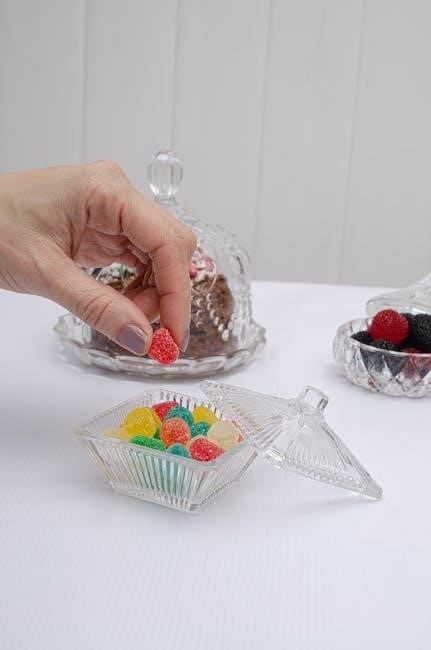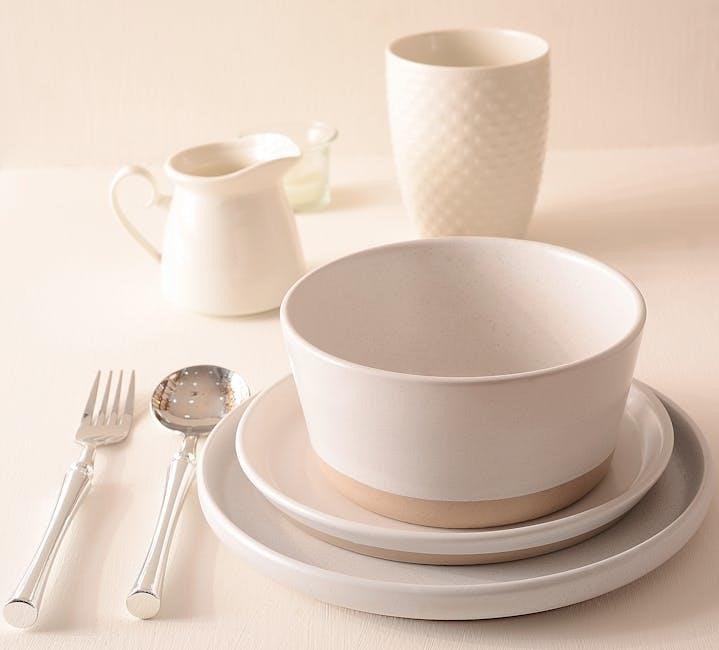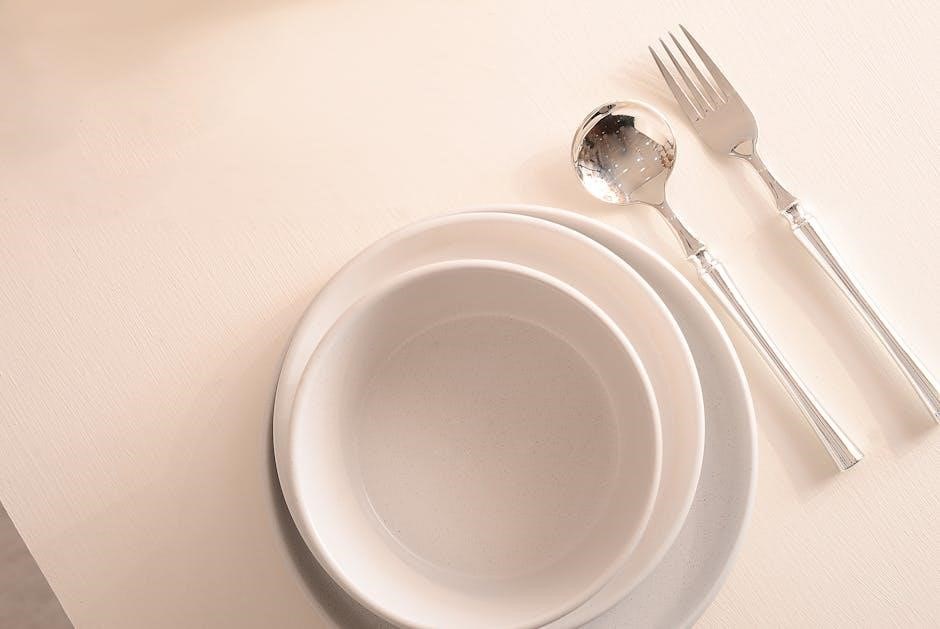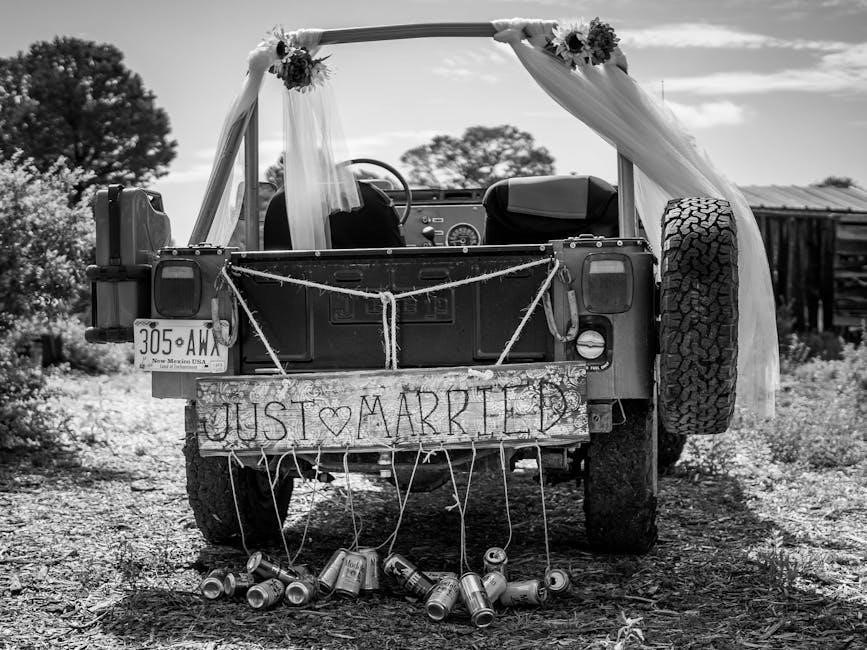Overview
Obtaining a New Jersey marriage license is a crucial step for couples planning to wed in the state, involving specific legal requirements and processes to ensure proper documentation and recognition of the union.

Eligibility Requirements
To apply for a New Jersey marriage license, applicants must meet specific eligibility criteria. Both parties must be at least 18 years old, or provide parental consent if under 18. The marriage must be between two consenting adults who are mentally capable of entering into the union. Same-sex marriages are legally recognized in New Jersey, ensuring equality for all couples. Applicants must not be closely related by blood, as marriages between siblings or parents and children are prohibited. If either party has been previously married, they must provide a certified copy of their divorce decree or spouse’s death certificate. Additionally, there is a mandatory 72-hour waiting period after submitting the application before the license is issued. Non-residents can apply in the municipality where the ceremony will take place. These requirements ensure that all marriages in New Jersey are legally valid and recognized.

Application Form
The New Jersey marriage license application form is available online and at local registrar offices. It must be completed in advance, except for the signature, which is done in person. Applicants can submit the form online or in-person at the registrar’s office, ensuring all required information is accurately provided before submission.
3.1 Completing the Form
Completing the New Jersey marriage license application form requires careful attention to detail to ensure accuracy and compliance with state requirements. The form can be completed online or in person at the registrar’s office. Applicants are advised not to sign the form until they meet with the registrar, as the signature must be witnessed. All information, including personal details, residency, and previous marriages, must be accurately provided. The form includes sections for both applicants, and it is essential to fill in all required fields to avoid delays. Additionally, the form may include specific instructions or notes regarding name changes or gender options. It is crucial to review the form thoroughly before submission to ensure there are no errors or omissions. Once completed, the form is submitted along with the required documents, and the process for obtaining the license can proceed smoothly.

Required Documents
To apply for a New Jersey marriage license, specific documents must be provided to verify eligibility and identity. Applicants are required to present a valid form of identification, such as a driver’s license, passport, or state-issued ID. A birth certificate or passport is also necessary to confirm age and citizenship. Divorced individuals must provide the date of their divorce, and if a spouse is deceased, a death certificate may be required. Social Security numbers are typically needed, though the physical card is not always required. Additional documentation, such as proof of residency, may be requested depending on the municipality. It is essential to ensure all documents are valid and up-to-date to avoid delays in processing the application. Applicants should verify with their local registrar’s office for any specific requirements or additional documentation needed.
Fees and Costs
The current fee for a New Jersey marriage license application is $28, which covers the processing and issuance of the license. This fee is typically non-refundable and must be paid at the time of application. Payment methods vary by municipality but may include cash, check, or credit card. Additional costs may apply for extra services, such as expedited processing or certified copies of the marriage certificate, which can range between $10 to $20 per copy. It’s important to verify the exact fee structure with the local registrar’s office, as costs may vary slightly depending on the location. Failure to pay the required fee will delay the issuance of the marriage license. Applicants are advised to call ahead to confirm payment methods and any additional fees associated with their application.

Waiting Period
In New Jersey, there is a mandatory 72-hour waiting period after submitting the marriage license application before the license can be issued. This period begins once the application is officially filed with the local registrar’s office. The waiting period applies to all applicants, including non-residents and same-sex couples. During this time, the couple is not permitted to hold the ceremony, as the license will not be valid until the waiting period has elapsed. The 72-hour period is designed to allow couples time to review their decision and ensure they are ready to proceed with the marriage. Once the waiting period is complete, the license is issued and remains valid for 30 days, during which the ceremony must take place. Couples should plan accordingly to ensure the license is obtained in time for their scheduled wedding date.

Non-Resident Applications
Non-residents of New Jersey can apply for a marriage license in the state by following specific procedures. The application must be submitted to the municipal registrar in the city or town where the wedding ceremony will take place. Non-resident couples are required to complete the same marriage license application form as residents, providing all necessary documentation, such as proof of identity and age. The process is streamlined to accommodate out-of-state applicants, ensuring they can obtain the license without unnecessary delays. Once the application is filed, a 72-hour waiting period applies before the license is issued. Non-resident applicants should plan accordingly to ensure the license is valid for their scheduled ceremony date. The license is valid for 30 days after issuance, allowing flexibility for couples to finalize their wedding plans. This process ensures that non-residents can legally marry in New Jersey without additional complications.
Same-Sex Marriage Applications
New Jersey has been at the forefront of recognizing and supporting same-sex marriage, ensuring equality in the application process for all couples. The state’s marriage license application form is inclusive, allowing same-sex couples to apply without discrimination. In 2023, New Jersey updated its forms to remove gender-specific language, ensuring that all applicants, including nonbinary individuals, can accurately represent their identity. The application process for same-sex couples mirrors that of heterosexual couples, requiring the same documentation, such as proof of identity and residency. The state has also addressed past issues where some municipalities had exclusionary practices, now mandating that all forms and processes comply with anti-discrimination laws. This inclusive approach reflects New Jersey’s commitment to equality, making the marriage license application process accessible and respectful for all couples, regardless of gender or sexual orientation. Same-sex marriage applications are processed with the same timelines and requirements as any other marriage application, ensuring uniformity and fairness.

Application Process
Complete the application form online or in person, submit it to the local Registrar, and wait 72 hours for processing. Do not sign the form before visiting the office.
9.1 How to Apply
To apply for a New Jersey marriage license, couples must complete the application form, which can be obtained online or from the local Registrar’s office. The form requires detailed personal information, including names, dates of birth, and residency details. Both applicants must appear in person at the Registrar’s office to submit the application. Required documents include proof of identity (such as a driver’s license, passport, or state ID) and, if applicable, divorce or death certificates. The application must be signed in the presence of the Registrar. After submission, there is a mandatory 72-hour waiting period before the license is issued. Once approved, the license is valid for 30 days. Couples should ensure all information is accurate to avoid delays. The process is straightforward, but adherence to specific requirements ensures a smooth application experience.
Name Change Options
While the New Jersey marriage license application form does not directly facilitate name changes, couples have the option to change their names after marriage. Typically, individuals can update their names on legal documents such as driver’s licenses, passports, and social security cards by providing their marriage certificate. The process usually involves submitting a formal request and supporting documentation to the relevant authorities. It is recommended to complete the marriage ceremony first, as the marriage certificate is often required for name changes. Couples should consult local authorities or legal advisors for specific guidance on the name change process in their area. The marriage license application form serves as the initial step, but the actual name change occurs post-marriage through separate procedures. Planning ahead and gathering necessary documents can streamline the process for those wishing to change their names after tying the knot in New Jersey.